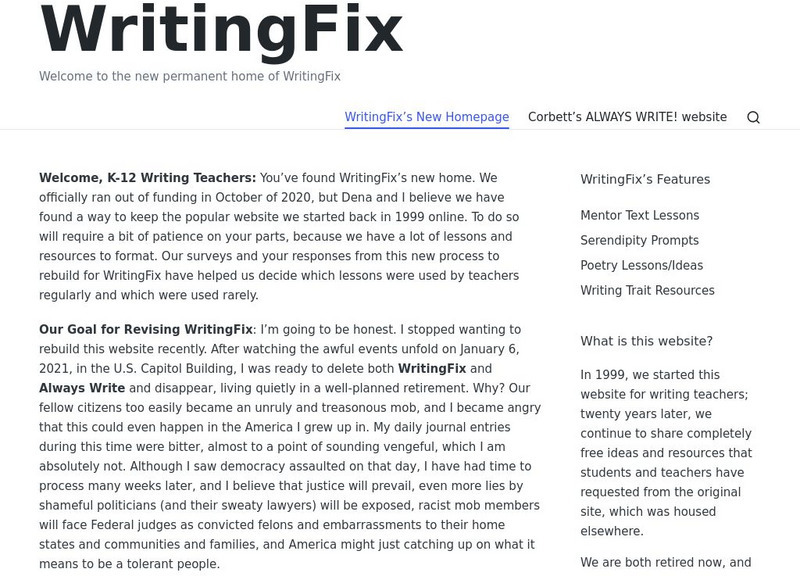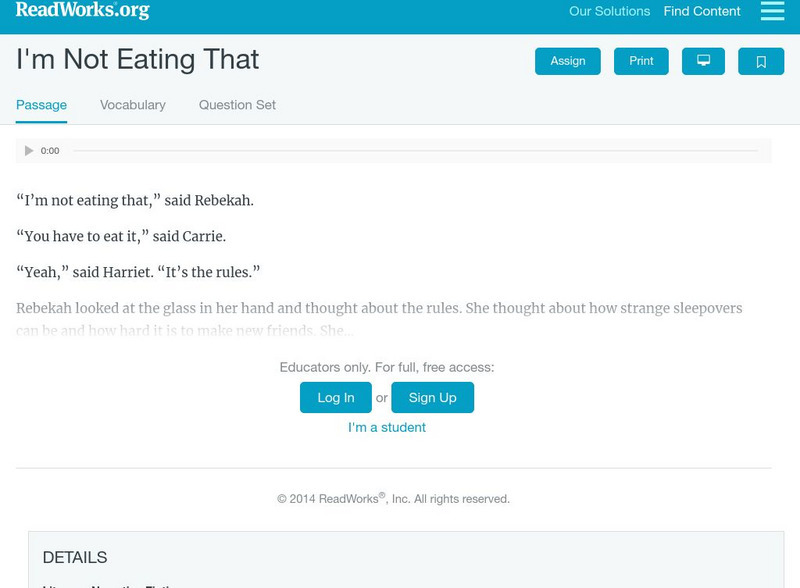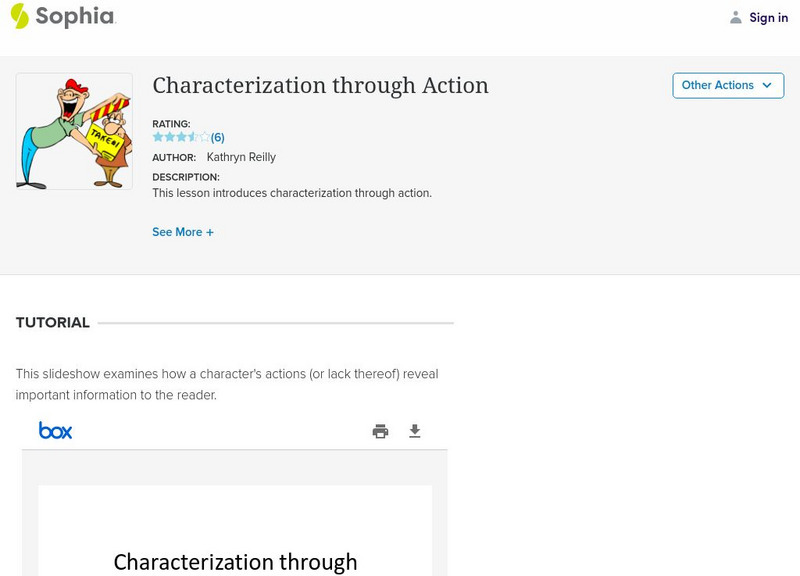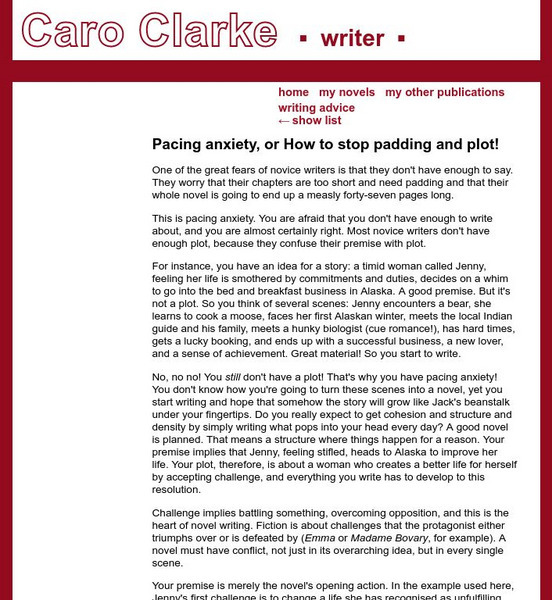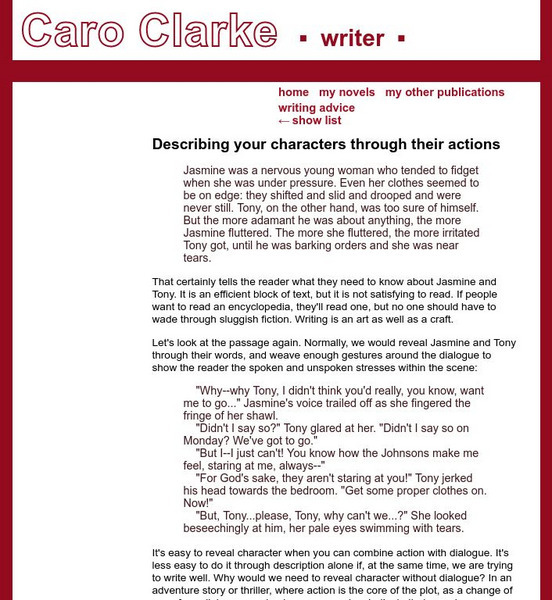Curated OER
National Park Service: Elements of Literature [Pdf]
A PDF glossary listing and defining literary elements.
Writing Fix
Writing Fix: Actions Speak Louder Than Words
After hearing and discussing an excerpt from Sharon Creech's Walk Two Moons, young scholars will plan to create a unique description of a character that uses memorable actions that "show" a person's character. They will brainstorm verbs...
Writing Fix
Writing Fix: Counting Up or Down Stories
The writer will brainstorm situations where individuals or people in a group count up or count down out loud together. Using the ending of chapter 5 of Wringer by Jerry Spinelli as a model, the writer will plan a story where someone (or...
ReadWriteThink
Read Write Think: Character, Conflict, Resolution, Setting
This interactive lesson allows students to study and analyze the text concepts of character, conflict, resolution, and setting in a "Broadcast news," format.
ReadWriteThink
Read Write Think: Writing Alternative Plots for Robert O'brien's Z for Zachariah
Lesson in which students are required to write an alternative plot to O'Brien's science fiction novel. Includes an interactive graphic organizer, handouts, and a rubric.
E Reading Worksheets
E Reading Worksheets: Differentiated Reading Instruction Worksheets, Activities
A collection of differentiated reading activities are provided in this collection. Worksheets for the following reading topics are included: climax, story structure, elements of a story; fact and opinion; summarizing, narrative sequence;...
E Reading Worksheets
E Reading Worksheets: Story Structure
In this learning module, students will learn more about the structure of a short story. Notes and video clips are provided to reinforce understanding of story structure. This module is designed to support Tier I, Tier II, and Tier III...
E Reading Worksheets
E Reading Worksheets: Story Structure Activities
This learning module provides remediation and extra practice with analyzing story structures. Reinforcement for story structures is provided through the two PowerPoint lessons, three quizzes, and four different worksheets.
TES Global
Tes: Prose: Short Stories
[Free Registration/Login Required] In this downloadable learning module, students will write a short story. Students will refer to the grading rubric to help them self-assess their writings. Students will revise and edit
Tom Richey
Slideshare: Introduction to the Elements of Fiction
A slide show with twenty-two slides about story elements. Includes definitions, information, and examples of character terms, setting terms, plot terms, conflict terms, and more
Caro Clarke
A, B, and C Characters
This is the ninth article in a series that focuses on helping the new novel author. This article focuses on what the author calls "A, B, and C Characters," used to describe the different levels of characters.
Other
Lifestream Center: Lessons: Literary Concepts: Elements of a Story
This site offers a basic understanding of the elements of a story. It clearly defines each literary term.
Read Works
Read Works: I'm Not Eating That
[Free Registration/Login Required] A literary text about making new friends. A question sheet is available to help students build skills in reading comprehension.
Sophia Learning
Sophia: Characterization
This slideshow focuses on characterization including defining and discussing the 5 methods of characterizations: speech, action, description, interaction, and thoughts with examples of each. It also covers the importance of...
Sophia Learning
Sophia: Characterization Through Action
A seven-slide presentation discussing how a character's traits are developed and revealed through action in a literary text.
Other
Elements of Fiction
Simple discussion of the elements of fiction with a specific section devoted to Freytag's Pyramid (aka "basic plot structure"). A good place to start for gathering information on the structure of narrative.
Caro Clarke
Caro Clarke: Pacing Anxiety, or How to Stop Padding and Plot!
This is the seventh installment of a series giving advice to the author who is new to writing novels. This article focuses on how to take your characters and use them and their conflicts to develop the plot of your story. W.9-10.3b...
Caro Clarke
Describing Your Characters Through Their Actions
This is the tenth in a series of articles designed to help the new novel author. This article focuses on how to develop characters through their actions instead of simply relying on dialogue and description of thoughts. W.11-12.3d...
Texas Education Agency
Texas Gateway: Analyze the Central Characters in Literary Text/fiction
Learn how the central characters' qualities influence theme and resolution of the central conflict.
Texas Education Agency
Texas Gateway: Analyze Linear Plot Developments in Literary Texts/fiction
[Accessible by TX Educators. Free Registration/Login Required] You will learn how to use the elements of linear plot development to determine whether and how conflicts are resolved.
Texas Education Agency
Texas Gateway: Compare/contrast Themes and Genres in Literary Texts
You will learn how to analyze, make inferences, and draw conclusions about theme and genre in different cultural, historical, and contemporary contexts and provide evidence from the text to support your understanding.
Texas Education Agency
Texas Gateway: Characters and Staging in Drama
[Accessible by TX Educators. Free Registration/Login Required] In this lesson, you will analyze how different playwrights characterize, or develop, their protagonists and antagonists through the dialogue and staging of their plays.
ReadWriteThink
Read Write Think: Plot Structure: A Literary Elements Mini Lesson
Contains plans for two lessons that ask middle schoolers to apply Freytag's Pyramid (also known as Freytag's Triangle) to pieces of writing, oral storytelling, and television shows. In addition to objectives and standards, this...
Quizlet
Quizlet: R.3 Analyze How and Why Individuals, Events, or Ideas, Develop/interact
Please align to CCSS.ELA-Literacy.CCRA.R.3 Analyze how and why individuals, events, and ideas develop and interact over the course of a text.
![National Park Service: Elements of Literature [Pdf] Handout National Park Service: Elements of Literature [Pdf] Handout](https://static.lp.lexp.cloud/images/attachment_defaults/resource/large/FPO-knovation.png)
